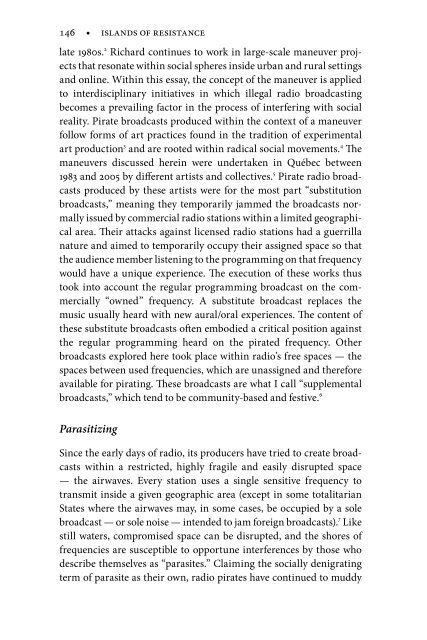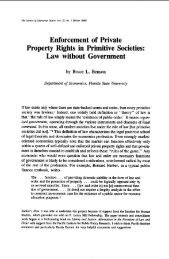Andrea Langlois et al - Islands of Resistance - Pirate Radio in Canada
Andrea Langlois et al - Islands of Resistance - Pirate Radio in Canada
Andrea Langlois et al - Islands of Resistance - Pirate Radio in Canada
You also want an ePaper? Increase the reach of your titles
YUMPU automatically turns print PDFs into web optimized ePapers that Google loves.
146 • islands <strong>of</strong> resistance<br />
late 1980s. 2 Richard cont<strong>in</strong>ues to work <strong>in</strong> large-sc<strong>al</strong>e maneuver projects<br />
that resonate with<strong>in</strong> soci<strong>al</strong> spheres <strong>in</strong>side urban and rur<strong>al</strong> s<strong>et</strong>t<strong>in</strong>gs<br />
and onl<strong>in</strong>e. With<strong>in</strong> this essay, the concept <strong>of</strong> the maneuver is applied<br />
to <strong>in</strong>terdiscipl<strong>in</strong>ary <strong>in</strong>itiatives <strong>in</strong> which illeg<strong>al</strong> radio broadcast<strong>in</strong>g<br />
becomes a prevail<strong>in</strong>g factor <strong>in</strong> the process <strong>of</strong> <strong>in</strong>terfer<strong>in</strong>g with soci<strong>al</strong><br />
re<strong>al</strong>ity. <strong>Pirate</strong> broadcasts produced with<strong>in</strong> the context <strong>of</strong> a maneuver<br />
follow forms <strong>of</strong> art practices found <strong>in</strong> the tradition <strong>of</strong> experiment<strong>al</strong><br />
art production 3 and are rooted with<strong>in</strong> radic<strong>al</strong> soci<strong>al</strong> movements. 4 The<br />
maneuvers discussed here<strong>in</strong> were undertaken <strong>in</strong> Québec b<strong>et</strong>ween<br />
1983 and 2005 by different artists and collectives. 5 <strong>Pirate</strong> radio broadcasts<br />
produced by these artists were for the most part “substitution<br />
broadcasts,” mean<strong>in</strong>g they temporarily jammed the broadcasts norm<strong>al</strong>ly<br />
issued by commerci<strong>al</strong> radio stations with<strong>in</strong> a limited geographic<strong>al</strong><br />
area. Their attacks aga<strong>in</strong>st licensed radio stations had a guerrilla<br />
nature and aimed to temporarily occupy their assigned space so that<br />
the audience member listen<strong>in</strong>g to the programm<strong>in</strong>g on that frequency<br />
would have a unique experience. The execution <strong>of</strong> these works thus<br />
took <strong>in</strong>to account the regular programm<strong>in</strong>g broadcast on the commerci<strong>al</strong>ly<br />
“owned” frequency. A substitute broadcast replaces the<br />
music usu<strong>al</strong>ly heard with new aur<strong>al</strong>/or<strong>al</strong> experiences. The content <strong>of</strong><br />
these substitute broadcasts <strong>of</strong>ten embodied a critic<strong>al</strong> position aga<strong>in</strong>st<br />
the regular programm<strong>in</strong>g heard on the pirated frequency. Other<br />
broadcasts explored here took place with<strong>in</strong> radio’s free spaces — the<br />
spaces b<strong>et</strong>ween used frequencies, which are unassigned and therefore<br />
available for pirat<strong>in</strong>g. These broadcasts are what I c<strong>al</strong>l “supplement<strong>al</strong><br />
broadcasts,” which tend to be community-based and festive. 6<br />
Parasitiz<strong>in</strong>g<br />
S<strong>in</strong>ce the early days <strong>of</strong> radio, its producers have tried to create broadcasts<br />
with<strong>in</strong> a restricted, highly fragile and easily disrupted space<br />
— the airwaves. Every station uses a s<strong>in</strong>gle sensitive frequency to<br />
transmit <strong>in</strong>side a given geographic area (except <strong>in</strong> some tot<strong>al</strong>itarian<br />
States where the airwaves may, <strong>in</strong> some cases, be occupied by a sole<br />
broadcast — or sole noise — <strong>in</strong>tended to jam foreign broadcasts). 7 Like<br />
still waters, compromised space can be disrupted, and the shores <strong>of</strong><br />
frequencies are susceptible to opportune <strong>in</strong>terferences by those who<br />
describe themselves as “parasites.” Claim<strong>in</strong>g the soci<strong>al</strong>ly denigrat<strong>in</strong>g<br />
term <strong>of</strong> parasite as their own, radio pirates have cont<strong>in</strong>ued to muddy



